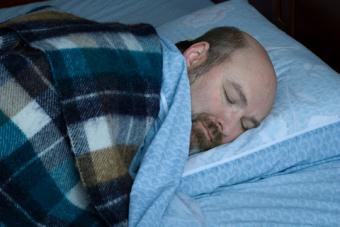
The definition of awake is a bit more complex than simply "not sleeping". Bodies change in many subtle ways during sleep, and by observing these we can clearly define what being awake is not. The stages of sleep affect the body in many different ways, and the changes noted between the stages are what allow doctors to clinically define the difference between sleep and wakefulness.
Awareness
One of the most important characteristics of the waking state is awareness. While people are awake, their eyes, ears, noses, and skin are constantly registering and recording environmental and internal stimuli. A person who is awake knows what is going on around him or her, and can respond to changes in the environment.
In sleep, the body shuts out most external stimuli. Sleeping people are not usually able to carry on coherent conversations, and may not even respond to noises or changes in light when in deep sleep. Generally people don't perceive much of their surroundings when they are sleeping, although sleeping people are usually able to respond to a shake of the shoulder or a loud voice calling their name.
Movement
When people are sleeping, they don't move around very much. The muscles relax, and breathing slows. During the most active stage of sleep, the REM phase, the body even experiences a natural paralysis. The "sleep paralysis" prevents the thrashing that might occur if people moved in sleep as they do in their dreams.
During periods of wakefulness, people can move around as they wish. Muscles may carry a constant low level of tension while a person is awake, and breathing is faster. A person who is awake is able to communicate and interact with other people.
Physical Changes
Aside from slowed breathing during sleep, the heart rate usually drops slightly and blood pressure goes down. Body temperature also decreases, although not as drastically as that of animals who are capable of entering a state of torpor, or short-term hibernation.
This slowing of breathing and heart rate and decrease in temperature allows animals and humans to conserve energy. This extended period of inactivity means that an animal or human requires less food than if nights weren't spent in sleep.
Humans also secrete certain growth hormones during sleep that are important for growth in infants and tissue regeneration in adults.
Wakefulness and The Brain
A brain that is produces short spiky waves on an electroencephalogram (EEG) that are called beta waves. Beta waves are short and very irregular, which makes sense given the variety of different situations and stimuli a person typically encounters in a single day. The presence of beta waves on an EEG is one easy way to sum up the definition of awake, although the brain also emits some beta waves during rapid eye movement (REM) sleep.
As a person begins to fall asleep, the brain slows down into alpha waves, which are also present when someone is simply relaxing or meditating. Brain waves further slow into theta waves, which signal a state of limited or reduced consciousness. The slowest waves, called delta waves, occur only during deep sleep or when someone is in a coma. When the brain is emitting theta waves, the sleeping person will be very difficult to awaken and will feel groggy and drowsy upon awakening.
During REM sleep, brain waves most closely resemble waking brain wave patterns, but this stage of sleep is characterized by a sudden loss of muscle tone along with rapid eye movements. It is easiest to wake a sleeping person in the REM phase of sleep. Interestingly, people who are able to wake themselves up without an alarm clock will generally wake out of the REM stage closest to the time when they want to awaken, suggesting that a sleeper maintains some limited conscious awareness during REM sleep.
Definition of Awake
Scientists have only been able to clearly define the state of wakefulness by closely studying sleep and its many effects on the body. An awake and alert brain emits a characteristic wave pattern on an EEG, while a deeply sleeping person displays slow brain waves. Without sufficient sleep, the body and brain have trouble staying fully awake and alert, and people can only stay awake for so long before experiencing hallucinations, extreme sleepiness, and even paranoia.







